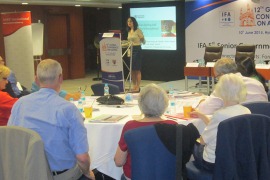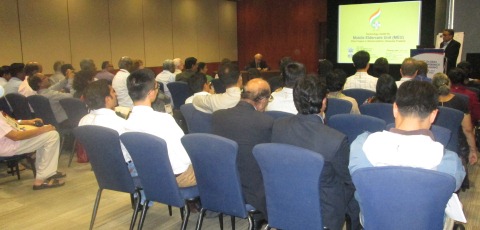WKC at the 12th IFA Global Conference on Ageing, 10-13 June 2014, Hyderabad, India

The 12th Global Conference on Ageing of the International Federation on Ageing (IFA) on the theme “Health, Security and Community” was successfully held on 10-13 June 2014 in Hyderabad, India, hosted by the Heritage Foundation, India. More than 300 delegates representing 49 countries participated- exploring, discussing and recommending actions on several sub-themes, inclusive of rights of older people; noncommunicable diseases; disability and ageing; quality of care and standards; income security; labour and workforce participation, age-friendly cities and communities; ageing in place; and innovations in care.
WKC Symposium:
"Driving Innovation for Ageing Populations: Results from WHO-commissioned studies of the needs of older persons for medical and assistive devices in 8 Asian countries"
Dr Jostacio M. Lapitan, Technical Officer, WKC, presented an “Overview of studies on needs, availability and affordability of assistive and medical devices for ageing populations in 8 Asian countries: Australia, China, Fiji, Japan, Malaysia, Philippines, Republic of Korea and Viet Nam” towards accomplishing the strategic objective of WHO: “to ensure the improved access, quality and use of medical products and technologies”. He concluded by emphasizing that: 1) these two systematic reviews and studies conducted in 2012-2013 were the initial work started by WHO in this field; 2) driving innovation for ageing populations has to be guided by the “Q (quality) and 5A principles” – availability, accessibility, acceptability, adaptability and affordability; and 3) research and further action must continue.
“Governments play a vital role in getting affordable assistive devices (AD) and medical devices (MD) to those who need it”, stated Dr Lloyd Walker, Director, Tech4Life. Reporting on the results of a recent survey on “Needs analysis on AD and MD for older people in six Western Pacific countries” concluded in February 2014. Dr Walker expressed gratitude for the technical support of WHO and the Ministry of Health, Labour and Welfare, Japan for funding the survey. He proposed that future work 1) continue to refine the methodology and implementation of the survey methods 2) validate survey results with samples of older people themselves; 3) effectively integrate AD and MD with other health services; and 3) educate and train professionals and communities on identifying which AD and MD they require, selecting, and maintaining them.

During the open forum that followed the presentations, participants appreciated the action research done in harnessing the uses of technological and social innovations to serve a rapidly ageing world. There was a lively discussion regarding the need for: 1) a “clearing house” on innovations for ageing populations; 2) standardization of nomenclature; 3) inclusion of gender-sensitive and user-responsive assistive devices (e.g., for cooking); 4) technological and psycho-social innovations for the elderly; and 5) innovations that are aligned to the six principles of “Q and 5As” that would be applicable to diverse settings and terrains (e.g., mountainous India and island states such as Maldives). The symposium was closed by the chair, Mr Ross, thanking all presenters and audience for the engaging and interactive exchange of ideas in the best interests of ageing populations.
Mr Ross presented in a plenary session, Life Course Immunization, on 12 June, providing an overview of “Vaccines for Older Populations: Knowledge, adaptation, implementation”. Mr Ross presented a comprehensive overview of the need, benefit and limitations of older persons accessing and using vaccines; the need to better understand underlying immunological science for older persons; adapting existing vaccines; as well as, paying attention to financing and increasing demand by older persons.
Presentations:
- “Introduction: Overview of the needs and gaps for medical and assistive devices for ageing populations: an agenda for innovation”
Mr Alex Ross, Director, WHO Kobe Centre (WKC)
- “Overview of studies on needs, availability and affordability of assistive and medical devices for ageing population in 8 Asian Countries: Australia, China, Fiji, Japan, Malaysia, Philippines, Republic of Korea and Viet Nam”
Dr Jostacio M. Lapitan, Technical Officer, Innovation for Healthy Ageing, WKC
- “Needs analysis on assistive and medical devices for older people in six countries in the WHO Western Pacific Region: China, Japan, Malaysia, Philippines, Republic of Korea and Viet Nam”
Dr Lloyd Walker, Director, Tech4Life, Australia
- "Technology model for Mobile Eldercare Unit (MEU) – Pilot project in Shimla District, Himachal Pradesh"
Mr Matthew Cherian, Chief Executive, HelpAge, India
- “Vaccines for Older Populations: Knowledge, adaptation, implementation"
Mr Alex Ross, Director, WHO Kobe Centre (WKC)
(At the plenary session on Life Course Immunization, 12 June 2014)


